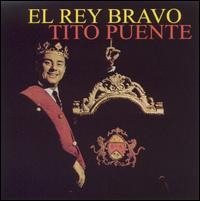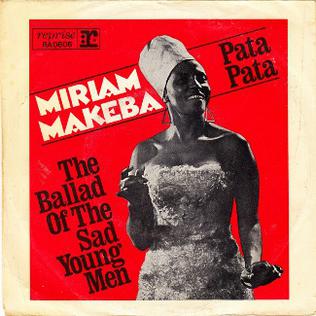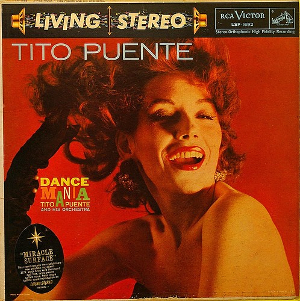
Celia Caridad Cruz Alfonso, known as Celia Cruz, was a Cuban singer and one of the most popular Latin artists of the 20th century. Cruz rose to fame in Cuba during the 1950s as a singer of guarachas, earning the nickname "La Guarachera de Cuba". In the following decades, she became known internationally as the "Queen of Salsa" due to her contributions to Latin music. She had sold over 10 million records, making her one of the best-selling Latin music artists.
Carlos Manuel "Charlie" Palmieri was a Puerto Rican bandleader and musical director of salsa music. He was known as the "Giant of the Keyboards".

Pablo Rodríguez Lozada, better known as Tito Rodríguez, was a Puerto Rican singer and bandleader. He started his career singing under the tutelage of his brother, Johnny Rodríguez. In the 1940s, both moved to New York, where Tito worked as a percussionist in several popular rhumba ensembles, before directing his own group to great success during the 1950s. His most prolific years coincided with the peak of the mambo and cha-cha-cha dance craze. He also recorded boleros, sones, guarachas and pachangas.
A descarga is an improvised jam session consisting of variations on Cuban music themes, primarily son montuno, but also guajira, bolero, guaracha and rumba. The genre is strongly influenced by jazz and it was developed in Havana during the 1950s. Important figures in the emergence of the genre were Cachao, Julio Gutiérrez, Bebo Valdés, Peruchín and Niño Rivera in Cuba, and Tito Puente, Machito and Mario Bauzá in New York. Originally, descargas were promoted by record companies such as Panart, Maype and Gema under the label Cuban jam sessions. From the 1960s, the descarga format was usually adapted by large salsa ensembles, most notably the Fania All-Stars.

Guadalupe Victoria Yolí Raymond, better known as La Lupe, was a Cuban singer of boleros, guarachas and Latin soul known for her energetic, sometimes controversial performances. Following the release of her first album in 1961, La Lupe moved from Havana to New York and signed with Tico Records, which marked the beginning of a prolific and successful career in the 1960s and 1970s. She retired in the 1980s due to religious reasons.
Tommy Olivencia was a renowned Puerto Rican bandleader of salsa music.

Juan Pablo Knipping Pacheco, known as Johnny Pacheco, was a Dominican musician, arranger, composer, bandleader, and record producer. Born in the Dominican Republic, Pacheco became a leading figure in the New York salsa scene in the 1960s and 1970s as the founder and musical director of Fania Records.

Pedro Juan Rodríguez Ferrer, better known as Pete "El Conde" Rodríguez, was a salsa singer born in Barrio Cantera, Ponce, Puerto Rico. His son, also named Pete Rodriguez, is also a salsa and jazz musician. His daughter, Cita Rodriguez, is also an accomplished salsa singer.
Ángel Santos Vega Colon, aka Santitos Colón, was a Puerto Rican bolero and mambo singer, born in Sabana Grande, Puerto Rico and raised in Mayagüez. He was also known by the moniker: "The Man with The Golden Voice".

Melina Almodóvar, also known as La Muñeca de la Salsa and La Chica Del Bling, is a Puerto Rican salsa singer, songwriter, dancer, and entertainer. Known for her high-energy performances and salsa dancing skills, she combines old-school salsa moves with contemporary styles of dancing and singing. She established the Orquesta Caliente salsa orchestra in the Southern United States.

"Oye Cómo Va" is a 1962 cha-cha-chá song by Tito Puente, originally released on El Rey Bravo. The song achieved worldwide popularity when it was covered by American rock group Santana for their album Abraxas. This version was released as a single in 1971, reaching number 13 on the Billboard Hot 100, number 11 on the Billboard Easy Listening survey, and number 32 on the R&B chart. The block chord ostinato pattern that repeats throughout the song was most likely borrowed by Puente from Cachao's 1957 mambo "Chanchullo", which was recorded by Puente in 1959.

"Pata Pata" is an Afro-pop dance song popularized internationally by South African singer Miriam Makeba. "Pata Pata" is credited to Makeba and Jerry Ragovoy. Her most popular recording of "Pata Pata" was recorded and released in the United States in 1967. The song is considered by many to be Makeba's signature hit and it has since been recorded by many artists.
Ignacio Berroa is a jazz drummer.

Dance Mania is a studio album by American musician Tito Puente. The album was added to the National Recording Registry in 2002. It is also listed among the 1001 Albums You Must Hear Before You Die.
Mario Rivera was a Latin jazz saxophonist from the Dominican Republic. Besides saxophone, Rivera played trumpet, flute, piano, vibraphone, congas, and drums.

Ernest AnthonyPuente Jr., commonly known as TitoPuente, was an American musician, songwriter, bandleader, timbalero, and record producer. He composed dance-oriented mambo and Latin jazz music.

Harvey Averne has been described as "one of several prominent Jewish Americans in New York's bustling Latin music scene."

Definitely La Yi Yi Yi, also known as Definitivamente La Yi Yi Yi is an album by La Lupe. It was released by Tico Records in 1969. AllMusic gave the album a rating of four stars.

Two Sides of La Lupe, also known as Dos Lados de La Lupe is an album by La Lupe and Tito Puente. It was released by Tico Records in 1968.
Jon Evan Fausty was an American multiple Grammy Award-winning sound and recording engineer best known for his work on some of the most successful Latin albums ever recorded.












